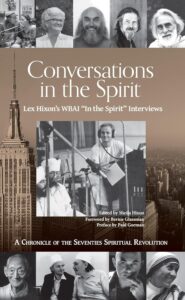
|
Interview from March 18, 1973 |
|
Lex Hixon: I had the good fortune recently of spending the day with BrotherDavid. We drove up to Yale University where he was to give a seminar at the Divinity School. Before he became a monk, Brother David received a Ph.D. degree in experimental psychology from the University of Vienna and he begins this seminar on the note of the psychological realm and the spiritual realm. Brother David: I started out in the psychological field and eventually came to see that I wouldn’t find the spiritual there. It didn’t seem to be an element of the psychological study. Somehow, in the course of [those] years of studying psychology in Austria, I came to see there were certain areas that made human beings human, which we didn’t get into in depth at all because we never asked the questions that belong to that. As a student of psychology, I came to see that you don’t find the spirit in psychology unless you ask spiritual questions. If you ask psychological questions, you will always get psychological answers. Also, there must be openness to the questioning. You will not find the spirit as an element, as something discrete. The best expression that I have come across so far is “the human being’s openness toward the divine.” I think this has much to do with what we call “the heart.” I think for most of us it suggests the bottomlessness of human existence. What we really mean when we say that something speaks to our heart is that we give ourselves to it and that it goes to our very being. We are not using the term “heart” in the emotional sense, but in the biblical sense, in which it means the whole person. It means the taproot of the whole person before we are spread out into intellect, will, and emotions. It means all our emotions. It also means all our intellect and all our willpower, the whole human person, and somehow that whole human person at the point at which we are open in freedom. I cannot leave out the concept of freedom when I speak about the spirit and that is exactly the point at which psychology stops, because as far as psychology is concerned, everything is determined. But on the level of the heart, somehow you find that freedom. It is not tangible; you can never say, “That’s why I know,”or “This was a perfectly free choice, you could have done this or that.” It is more like an intuition. What I am really looking for is gratefulness. I think you can detect a grateful heart. It is a phenomenon; you can somehow grasp it phenomenologically. It is somehow entering into the realm of psychology, sociology, in every respect, but it is a phenomenon of the spirit. It transcends sociology and psychology. That’s what I Iook for. Lex Hixon: I consider the matter of monastic or household life merely a question of lifestyle because it seems to me that the real practice of the spirit—for instance, the Prayer of the Heart, which is a real Christian practice of meditation—is something open in every time to every person and it is the core of experiencing the spirit. It is the practice of the divine presence in the heart. You talked about the heart in the beginning, and I wondered if you could say something more about the heart, more specifically about a technique for getting into the heart. Brother David: I’m glad that you point out the Prayer of the Heart, the Jesus Prayer, in this connection. There are certain practices that really bridge the gap completely and they are as open to the householder as they are open to the monk. The Prayer of the Heart is one of these. It’s the repetition of the name of Jesus, which has been practiced by monks and laypeople throughout the centuries. Most people know about it from Franny and Zooey by J.D. Salinger, or from The Way of the Pilgrim. It really consists in bringing your mind into your heart and repeating the name of Jesus there. Lex Hixon: How do you come to your heart? Brother David: This is a very difficult thing to tell anybody else. I can only say, when you take something to heart—and we have all used the expression—well, you took it somewhere, and it is a conviction of mine that anything you take to heart turns into prayer, because the heart is the realm of prayer. The Litany of the Sacred Heart was very popular in the Catholic Church when I was a little boy. The Sacred Heart is described in one passage as “a burning furnace of love.” That is a tremendous image. When we come to our heart, each one of us is reaching a point in an inner realm that is not only most intimately ourselves, but most intimately united with all other human beings because, ultimately, we have only one heart. We are one heart—anything that you throw into that fire turns into fire, and that is prayer. So anything that we take to heart we are turning into prayer because it is burned up in the one heart that is the heart of creation. It would take a tremendous mastery of the Prayer of the Heart to really combine it with the Zen approach. But I do believe that it is possible, because “the Word” always leads us into the silence if we only give ourselves, and that “just” of Zen, of course belongs to that realm of silence. If you really practice the Prayer of the Heart, it will lead you into that silence. It is possible. And now let us close with a prayer: … I invite you to rise… Let our standing be a gesture of mindfulness of the ground on which we are standing, that this poor mistreated earth belongs to all of us together. As we stand, then, like plants on a good plot of ground, let our roots go down deeply into our hidden unity. Let’s stand in awe before all those thousands and thousands known and unknown, who have laid down their lives for the common cause of our human family, and let’s bow our heads to them. We share the glory of the human greatness and the shame of human failure. Standing firm then, in this oneness, let us close our eyes. Let’s close our eyes to bring home to ourselves our blindness as we face the future. Let us close our eyes to focus our minds on the inner light, our one common light in whose brightness we shall be able to walk together even in the dark. And let us close our eyes in the gesture of trust in the guidance of the one spirit that will move us if we open our hearts. The human heart is unfathomable. Into this depth let us silently sink our roots, for there lies the only source of peace.… Peace be with all of you! |
***
Excerpted from:

By Lex Hixon, Monkfish 2016.
Save 20% on Monkfish titles on Indiepubs, with FREE SHIPPING for orders of $40 or more.
You can subscribe to The Monkfish Reader here.
Follow us on social media:


